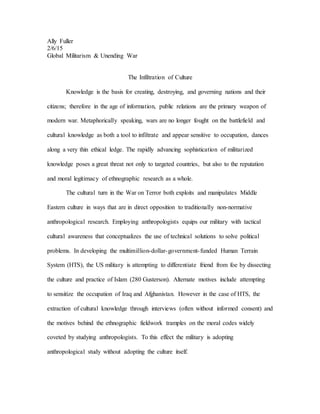
Assignment #1 Anthropological Knowledge and War
- 1. Ally Fuller 2/6/15 Global Militarism & Unending War The Infiltration of Culture Knowledge is the basis for creating, destroying, and governing nations and their citizens; therefore in the age of information, public relations are the primary weapon of modern war. Metaphorically speaking, wars are no longer fought on the battlefield and cultural knowledge as both a tool to infiltrate and appear sensitive to occupation, dances along a very thin ethical ledge. The rapidly advancing sophistication of militarized knowledge poses a great threat not only to targeted countries, but also to the reputation and moral legitimacy of ethnographic research as a whole. The cultural turn in the War on Terror both exploits and manipulates Middle Eastern culture in ways that are in direct opposition to traditionally non-normative anthropological research. Employing anthropologists equips our military with tactical cultural awareness that conceptualizes the use of technical solutions to solve political problems. In developing the multimillion-dollar-government-funded Human Terrain System (HTS), the US military is attempting to differentiate friend from foe by dissecting the culture and practice of Islam (280 Gusterson). Alternate motives include attempting to sensitize the occupation of Iraq and Afghanistan. However in the case of HTS, the extraction of cultural knowledge through interviews (often without informed consent) and the motives behind the ethnographic fieldwork tramples on the moral codes widely coveted by studying anthropologists. To this effect the military is adopting anthropological study without adopting the culture itself.
- 2. The impetus behind academic counterinsurgency is lost somewhere between our desperate need to name an enemy, and our fable attempt at a more humane approach to the Iraqi people. On one hand we are implementing cultural research in more effective interrogations, and on the other we’re maintaining the appearance of cultural sensitivity. As seen in the documentary Human Terrain, a computer program was developed to familiarize marines with Middle Eastern “cultural norms” in an attempt to minimize the arousal of conflict. In doing this, it promotes the idea that culture is static and reduces the Iraqi people to a homogenized, dehumanized foreign entity. This operationalization of culture ends up making it the enemy and the main problem with occupation. In the case of the HTS, gathering information on the “other” becomes manipulative and the motivation behind anthropological study is lost to militarized peacemaking. Often times abundantly funded think tanks and workshops subliminally glamourize military use of cultural knowledge, and the rising demand for anthropologists in the government greatly expands a previously narrow career path. Despite the fact that it violates the “do no harm” moral code and attempts to establish and evaluate cultural norms, many budding researchers are inspired by the prestigious title and salary. I would more accurately describe the methods of the HTS as cultural infiltration, as it is too morally removed to be considered anthropology. This distinction is a vital one in the sense that if ethnographic research associates with militarization and the fear and destruction that coincide, it could negatively affect the legitimacy of future study. The parasitic relationship between the US military and anthropological knowledge casts an ominous shadow on Western study of Eastern culture. It accentuates the heteropatriarchal definition of “us and them” in addition to potentially cancelling out
- 3. any countries with less sophisticated methods of gathering intelligence. The attempt to counter militarized anthropology begets the question: what is the basis of intention? If the pursuit of security and protection of interests perpetuates war, is it now possible that the pursuit of knowledge does? In developing methods of cultural preservation, we have also discovered methods of destruction and it appears impossible to accomplish one without the other.